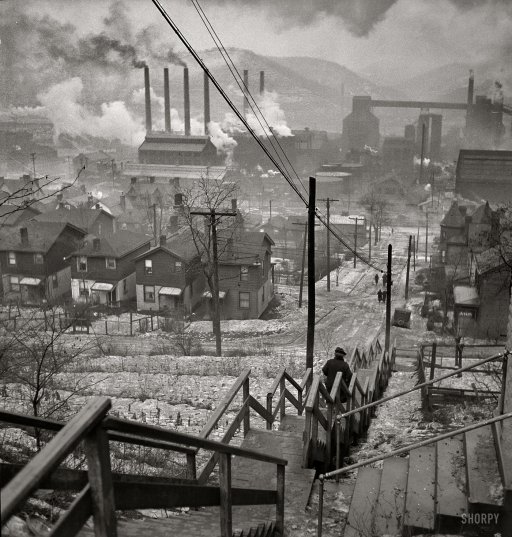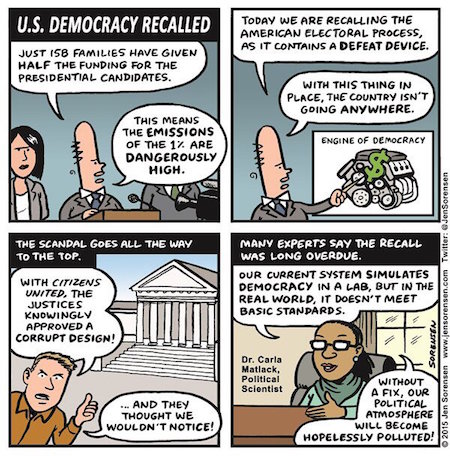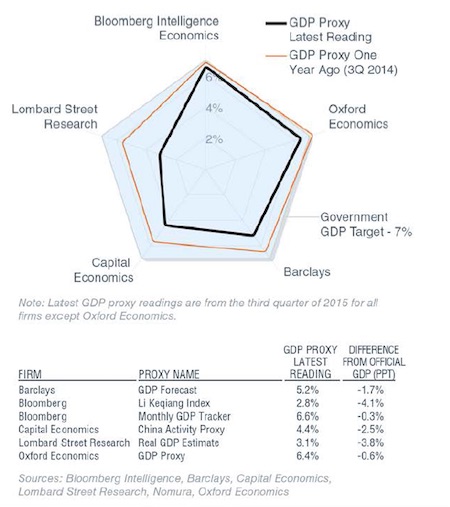
Jack Delano Long stairway in mill district of Pittsburgh, Pennsylvania 1940
If Angela Merkel wants to get rid of one of her major headaches, we suggest she should tell Volkswagen to move its operations from Wolfsburg to China. It may seem a strange thing to do at first blush, with 750,000 German jobs on the line, but bear with us here, because this could well be the only way to preserve at least some value for VW’s stock- and bondholders.
And several layers of German government, as well as German pension funds, are major investors. In a company that has now lost 40%, over €32 billion, of its market cap, and, according to an estimate by UBS, faces €35 billion or more in costs over the various emissions scandals. Count your losses, German pensioners! And the way things are going, and the way the scandal is widening, this may still be a conservative number.
Here’s the ‘thing’: after the most recent admissions coming from the carmaker and its affiliates it may well have become impossible for -international- lawmakers and lawyers alike to not go after Volkswagen with all they’ve got. First the EPA found a few days ago that defeat devices were installed in larger diesel engines too, those used in Porsche and Audi cars, instead of just the smaller ones whose testing by the University of West Virginia started this whole Teutonic drama.
Now we find that for VW’s petrol engines, too, various emissions have gone severely underreported. Porsche’s official reaction to the new diesel findings was that the company was ‘surprised’. Maybe that has something to do with the fact that the new Volkswagen CEO, Mueller, ran Porsche before being promoted to his present gig?! ‘Surprised’?
Other than that ‘surprise’ comment, both Audi and Porsche have reportedly flatly denied the very existence of the defeat devices in their products, even as the EPA research looks solid. Perhaps they should have been advised by their vast legal staffs that flat denial at this point in the game is a dangerous move.
VW has had ample time to come clean, with the EPA, with German regulators, as well as with a wide range of other regulators across the globe. But it’s abundantly clear they haven’t come clean. Moreover, thus far they’ve mostly been allowed to do their own in-house testing. And yes, that is as crazy as it sounds.
If and when the company is found to not have spoken the truth and nothing but the truth after the initial EPA findings (which, remember, followed a multi-year period of blatant lies, denial and deceit), replacing a CEO or pointing fingers at employees will no longer suffice. Heads will have to roll, and they will have to roll straight into prison cells.
At the same time, the company will be ordered, by regulators, lawmakers and judges, to pay fines so hefty its very existence will be in danger. VW lost 40% of its market cap and stands to lose 40% more in fines. An attractive investment? Only until the next lie gets exposed, one would presume.
This is no longer about the cost of repairs. And it’s no longer about greater fools still buying VW cars either. You can’t keep on lying to disguise your earlier lies and expect to get away with it just because you’re a large corporation.
That may not seem obvious or intuitive in today’s environment, but because attacks on VW will come from a multitude of sources -a dozen countries and ten dozen lawyers from all over the world-, regulators won’t want to be found going easy on VW as -some of- their peers go for the jugular. At some point, it gets to be about credibility.
Credibility of the EPA, and of all the other regulators. South Korea and Japan sales are plummeting, and India of all places is now getting on the bandwagon. This is not just a Merkel headache, it’ll be a migraine attack soon. Move the whole thing to China, Angela! Cut your losses…
Why China? We first thought of the VW-China connection because of this Jen Sorensen comic, but thought right away that it would be even much more applicable to China than it is (and it very much is, of course) to the US. That is, the idea of a political system with a built-in defeat device. China’s defeat device is its ‘official numbers’. The government says it wants X% growth, and that’s what comes out a year later.

What defeat device? Well, for one thing, Chinese President Xi Jinping looks to be starting a new personality culture in the vein of Mao, and presumably to that end last week introduced a new 5-year plan. But let’s be frank, these are things that don’t fit in a 2015 economy that relies on trade with the entire world.
The 2016-20 plan, which spans all corners of nation-building, represents Xi’s best chance to enact his reforms and establish a legacy before party retirement rules compel him to clear the way for a successor in 2022. “It bears Xi Jinping’s fingerprints, as does everything else in the Chinese government now. He is the top man, not first among equals, just first. One-man rule is back in China,” said Stein Ringen, a professor of sociology and social policy at the University of Oxford. “This is Xi saying, ’I am in charge and I will continue to be in charge.’”
That Xi goes down this path anyway shows us that he still seeks total control in the Mao or Deng Xiao Ping tradition, even though that is not remotely possible in an even half-open economic system. In China’s economy today, GDP growth can neither be planned nor fabricated. But the numbers still can! Which is where the defeat device comes in.
Xi Jinping cannot resist the temptations of a personality culture and at the same time demands a minimum 6.5% GDP growth over the next five years. A volatile combination. Question then is: what happens if and when growth is much lower than that? Who is Xi going to blame? And who are the Chinese people going to blame? What are the odds that a sub-6.5% growth rate will lead to mayhem?

But that’s just one side of the tale. There are many western observers, quite a few of them quite knowledgeable, who put Chinese GDP growth already at much less than 6.5 %. Lombard Street, Chris Balding, the Li Keqiang Index, Capital Economics, Danny Gabay, you just Google them, there are far too many critical views to ignore. And they on average put REAL China GDP growth at less than half XI’s 6.5% number.
And so again: what will happen when Mao-wannabe Xi can no longer fudge the numbers enough to make his 1.3 billion people believe? What will happen when the PBoC cannot buy sufficient assets with sufficient printed mullah to keep markets appear steady that haven’t been steady in ages?
The 5-year plan calls for GDP to double from 2010-2010, and for per capita income to do the same. Imagine if the US or EU set such goals. There’s no prediction, whether from the OECD or IMF or one of various central banks that comes even close to being correct after just one year, let alone five.
Xi Jinping’s 5-year plan should be read in the same way that one reads Alice in Wonderland. It is wishful thinking devoid of any sense of reality, and it’s only the inbuilt ‘official number’ defeat device that can provide it with an air of importance.
Apparently, China’s emissions numbers follow the same path, and the link to Volkswagen is again awfully easy to make in that respect too:
China has been consuming as much as 17% more coal each year than reported, according to the new government figures. By some initial estimates, that could translate to almost a billion more tons of carbon dioxide released into the atmosphere annually in recent years, more than all of Germany emits from fossil fuels.
The adjusted data, which appeared recently in an energy statistics yearbook published without fanfare by China’s statistical agency, show that coal consumption has been underestimated since 2000, and particularly in recent years. The revisions were based on a census of the economy in 2013 that exposed gaps in data collection, especially from small companies and factories.
Illustrating the scale of the revision, the new figures add about 600 million tons to China’s coal consumption in 2012 — an amount equivalent to more than 70% of the total coal used annually by the United States.
In other words, the deceit is built-in, it’s a feature not a flaw. That goes for both China’s and Volkswagen’s emissions models, and it goes for Xi Jinping’s 5-year plan. One common element seems to be desperation, the knowledge that certain aspired conditions cannot be met, and the subsequent decision to then fudge and cheat. That decision is made necessary by one thing only: incompetence.
We don’t want to harp this horse to death, the overall idea should be clear by now. But while writing, we do get new ideas popping up. Like those 750,000 Germans who depend on Volkswagen, directly or indirectly, for their jobs, can all move to China, and settle in some of the abundant ghost cities.
Their homes in Wolfsburg et al can then be made available to the 1 million or so refugees that Germany expects to settle in this year. Win win win, everybody happy.
But we remain anxious about what will happen if and when it becomes clear that the Chinese doubling of GDP and incomes is just a weird fantasy of a man who feels omnipotent enough to think he can control global financial markets. China has malinvested to such an extent that major busts are inevitable.
The British steel industry knows exactly what we mean. And predictions are that a year from now, all US aluminum smelters will be closed. China exports deflation. And that is being felt in its domestic economy too. So it looks like either Xi will need to crack down on his people, or they will crack down on him. Neither is an enticing prospect.
But he can’t tell the truth either, because it’s too far removed from the fairy tales he’s been telling. Just like Volkswagen.







